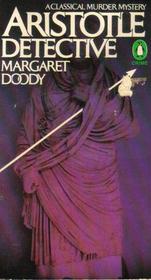For the first few chapters I wondered why this is considered a classic. But then I got sucked in and carried along and just HAD to know how the crime was committed and how the criminal was finally exposed.
The author did an excellent depicting Greece as it was then. Everything I've read about that period---and this includes college courses about Greek history and Aristotle's philosophy---made me feel it was truly authentic.
The author did an excellent depicting Greece as it was then. Everything I've read about that period---and this includes college courses about Greek history and Aristotle's philosophy---made me feel it was truly authentic.
Historical mysteries are not my thing, but I am told this is a classic.
From the back cover: When a violent murder leaves a prominent citizen dead and a falsely accused suspect in exile, a master philosopher turned part-time sleuth is drawn into the baffling mystery. The scene is Athens, 332 B.C.; the murder weapon is a bow and arrow; the investigator, an inexperienced young boy. There is only one mind capable of putting together the puzzling pieces--that of the great and wise Aristotle. Stephanos does the legwork, exploring the ins and outs of the city, and the master ponders the clues and weighs the evidence. In a splendidly dramatic trial before the supreme tribunal of Athens, Aristotle unmasks the villain in a dazzling display of deductive logic.




